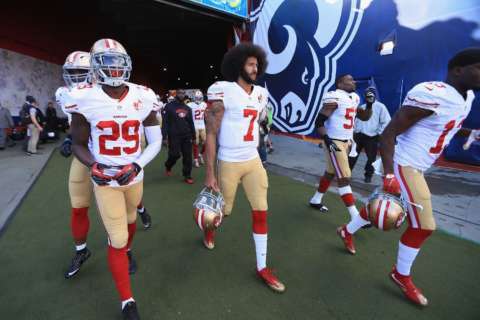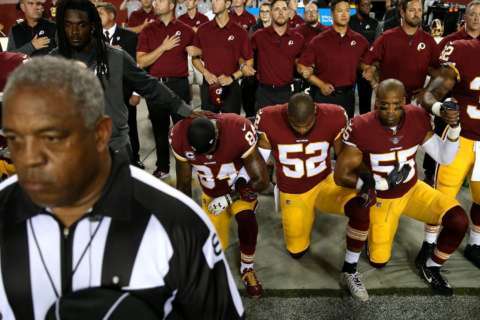WASHINGTON — Let me tell you a story.
In the minor leagues, the national anthem is sung every night. These performances are rarely delivered by professional musicians. The selection process varies from team to team, but often there are preseason tryouts, where nearly anyone able to sell a block of tickets to friends and family for the game on the night in question earns the chance to stand in front of the microphone at home plate. In other words, there is no meritocracy. Sell more tickets, get a better night to sing.
Some singers are fine. Some are even good! Many, as you might imagine, are not.
Some are so cringe-worthy as to be entirely unwatchable, offenses against our anthem far graver than any protest. Forgotten words; skipped verses; abrupt key changes; first-episode-of-the-new-season-of-American-Idol vocal atrocities. They should be punishable by law, or at least be finable offenses.
In no way do these renditions of the anthem honor the flag, or our country, or the men and women who have fought and died for it. Nor, for that matter, do many of the canned recordings routinely bleating and crackling through high school gym PA systems.
It’s time to stop playing the national anthem at sporting events.
I’m not saying it should never be played. Of course there could — and should — be exceptions. When Woodrow Wilson signed the executive order (later signed into law under Herbert Hoover) that made the Star-Spangled Banner our national anthem, he did so with intent for it to be used for patriotic occasions.
So play it on Memorial Day. Play it on the Fourth of July. Play it on Veteran’s Day. It will mean more in those settings; it will actually demand our attention, to think about what it signifies. It will certainly mean more than players wearing novelty camouflage jerseys and hats (on sale now — get yours today!).
International competitions are also a fitting place for the anthem. In that setting, it’s a reminder that you are representing your nation, wearing its colors. If you want to extend so far as national championships — the Super Bowl, the World Series, etc. — I’m fine with that as well. But it shouldn’t be an everyday, commonplace thing. The anthem should be a reminder of something greater than sports, that we’re lucky enough to be able to participate and watch and cheer despite whatever other awfulness the world might bring.
It should be pretty obvious to sports fans of any political persuasion that this is no longer the case. Two years ago, it became a venue for protest, to help draw attention to systemic racism, and the killing of unarmed black men, women and children by police (in case you forgot). But that message has been distorted. Now, it’s become a place for people like Jerry Jones to hijack the meaning of those initial protests, for fans to yell and curse at players, or worse. Take this story from Alaska in July, one that shows just how absurd our feelings about the song have become.
A summer college wood bat baseball league player stood, hands behind his back, for the anthem. A fan in attendance confronted the player, whose father was a Marine, to berate him for not placing his hand over his heart. The player was doing as he was taught, by members of the U.S. Army, ever since a graduate of his high school had died in Iraq and the school had honored him. He wasn’t even protesting.
This is where we are now, as a nation. Not just with individuals seeking out ways to be offended by perceived slights, but with everyone around such manufactured controversies feeling the need to justify everything they do in light of their own connections to the military. The net result is more fracture, more defensiveness, more divide between sides.
Did you know ESPN won’t even be televising the pregame anthem for this year’s Monday Night Football slate? According to Newsweek, CBS will continue to not air it, as it has done in the past. FOX will only air it for special occasions. We’ll see what NBC does with the season opener Thursday night. But if you’re just tuning in to see if they do air it, to see if someone does something, to see how the fans react? Then we’ve lost the point entirely.
So let’s stop doing this.
For those who want to protest in the future, there will always be other ways. The NFL’s misguided solution of militaristically forcing professional athletes — entertainers — to stand feels antithetical to the entire spirit of the “land of the free.” An almost entirely white cadre of owners demanding that a mostly black group of players stand hearkens back to some of our country’s worst history. Removing this flash point certainly won’t solve the underlying problems. But it might diffuse some unnecessary animosity.
Colin Kaepernick’s protest has already achieved its goal, whatever you think of the new Nike campaign. What’s left of the furor surrounding our national anthem isn’t serving anyone well. Now’s as good a time as ever to re-examine the forced patriotism — literally bought and paid for — our sports thrust upon us and to reconsider when, and why, the anthem should be played.






